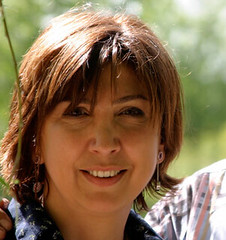Youth and the ecumenical movement: “There is a delicate dance going on in our churches”

Rev. Jennifer Leath
The Rev. Jennifer Leath is a member the World Council of Churches Joint Consultative Group with the Pentecostals and ECHOS, the WCC commission of youth. She is a member of the African Methodist Episcopal Church in the USA and identifies herself as “a Black American who lives in solidarity with those in the African Diaspora and all those who experience oppression, these are they who capture my heart.” Leath was one of the speakers at the 2011 WCC Central Committee plenary on “Ecclesiological Landscape”, where she shared a strong testimony on the issue of youth and ecumenical movement. She was interviewed by Marcelo Schneider.
What are your thoughts about the fact that most of the older members of the Central Committee joined the ecumenical movement through youth movements and organizations?
Well, all people in the plenary were once young and got involved in the ecumenical movement in the formative stages of it. Many of them came out of organizations that were designed specifically for youth earlier on, but today the landscape has changed. Such organizations don’t have the same impact they once did. This means that youth don’t have the same form of formation possibilities. However, I also think this is really a systemic issue. It is not about the WCC, but it is how we work in today’s society. It’s about power.
But is not the WCC in many ways a reflection of what is happening in the churches?
The issue is that all of the institutions with which we work – all of these structures have aged, and as they aged they did not set in place systems to make sure that their constituencies would be rejuvenated.
So is there a generation gap in the ecumenical movement?
I think that there definitely is, but I think that there is a delicate dance that is going on, because, on the one hand, it is very important for a fellowship of churches such as the WCC to have as much authority in its voice as possible – and the authority that is recognized in our institutional churches and in our regions and in our countries is that of the leaders of our denominations, and that leadership is often an older leadership.
And also in respect to the governments of our countries, they’re not paying attention to the voice of the youth in the same way that they pay attention to the voice of the leaders of these institutions. […] So there is this delicate dance between being powerful in the perception of the structures of society in which we participate and also maintaining a prophetic and youthful voice. Not that the prophetic and youthful voice are always the same, but sometimes they are.
What is the best way today for the youth to contribute for a change in the WCC?
Well, I think that we have to insist on being both a part of the living fellowship and a part of the governance structures, and that means that we need to be trained and know how the WCC governs itself. And the correction that we should make that our predecessors didn’t is that we should design in our structure a way to make sure that as we age others behind us can come up because we don’t want this problem again.
What is the role of the church of Jesus Christ in the world?
I dream of the church, the ekklesia, the calling together, of all people who are cherished and honoured because of the particularities that we bring and are able to realize these particularities as the Church Universal. We become universal only through our particularities and through the integrity of our particularities.
That is my theoretical answer. But actually the theoretical answer is insufficient because the church that I dream of is the church where none are free until all are free, it is the church where we do justice, love, kindness and walk humbly with our God. That means we do not rest, we do not sleep, we do not stop, we keep fighting.
Our mission is that everyone will be able to live with the benefits of this world that God has given us in an equal way, to share equally. We cannot fall prey to false ideas of meritocracy and we cannot act like we have already arrived. We have to acknowledge in a self-reflective way that we are not yet there and that until the eschaton we won’t be. God’s reign on earth is when we find ways to empower one another even when it means that we need to “disempower” ourselves or share power with others.
WCC
21.02.11
Harvest Day in the Armenian Evangelical Church of Anjar
Harvest day is celebrated every first Sunday of October, in an event organized by the women’s association of the Armenian Evangelical Church, who gather financial donations and offerings of vegetables and fruits for the KAHL Association, for the elderly and the blind.
Kevork Karaboyajian, manager of KAHL, conveyed the message of the day on Sunday, 3rd of October, where the donations of fruits and vegetables were piled up in an appealing way in the Armenian Evangelical church and a representative group from the KAHL Association was also present, who, after the service, were invited for lunch prepared by the women’s association.
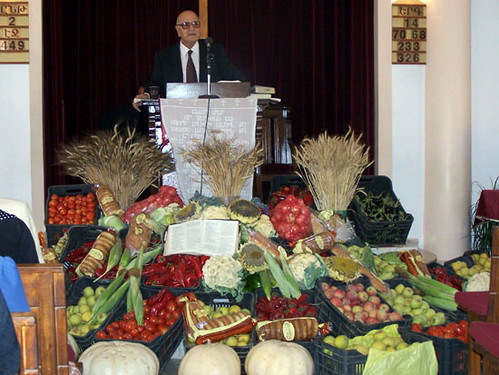
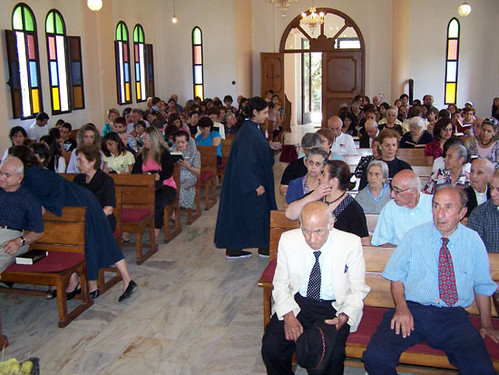
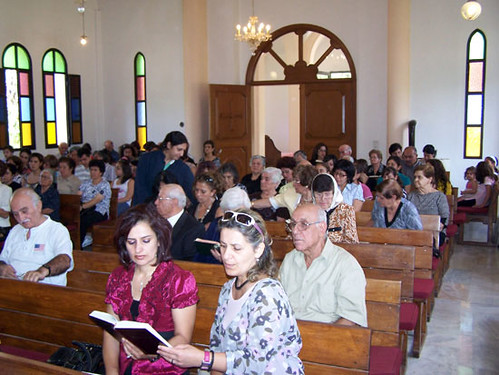
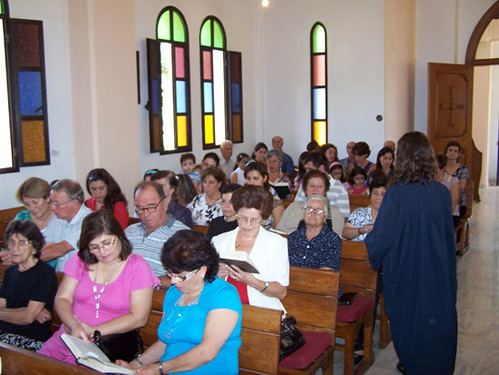
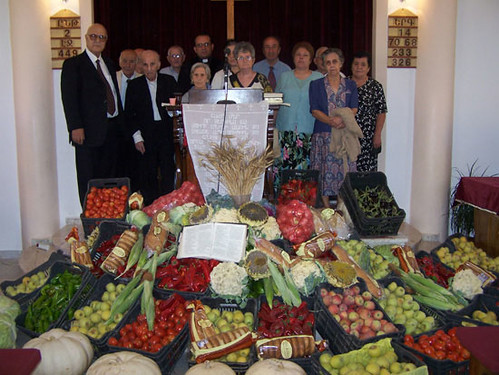
http://www.mousaleranjar.com
Kevork Karaboyajian, manager of KAHL, conveyed the message of the day on Sunday, 3rd of October, where the donations of fruits and vegetables were piled up in an appealing way in the Armenian Evangelical church and a representative group from the KAHL Association was also present, who, after the service, were invited for lunch prepared by the women’s association.





http://www.mousaleranjar.com
An Interview with Mrs. Maral Deyirmenjian, Today's Youth
Depression, aggression, drop-outs, drugs, indifference are some of the traits that we see in a-not-so-small number of our youth today. We raised this important issue, and had an interview with Mrs. Maral Deyirmenjian, the principal of the Armenian Evangelical Central High School, to give answers to our questions and provide us her professional feedback.
(Interview by Raffi)
(Interview by Raffi)
Raffi - Can you tell us about the differences that you see in the teenage students 10 years ago and the teenage students today?
Maral - Teenage students today have more distractions than what they had ten years ago: the accessibility of the internet at homes, ipods, MP3s, etc. come to entertain and distract the teenagers; these also interfere with their sleeping patterns. We often encounter students who have not slept more than four hours and come to class out of focus and exhausted.
The teenagers today are living in a hedonistic society; meaning, they are surrounded by a society that values pleasure over other personal values; this is a major obstacle in their pursuit of academic excellence, which is often the result of self-discipline and hard work.
The teenagers today are living in a hedonistic society; meaning, they are surrounded by a society that values pleasure over other personal values; this is a major obstacle in their pursuit of academic excellence, which is often the result of self-discipline and hard work.
Raffi - What are the needs of the teenagers and what kind of of challenges do they face today?
Maral - Teenagers need guidance, in my opinion. As Rousseau has stated, adults have to be “loving distant guardians”. We need to help them to develop their personalities and become independent individuals.
Raffi - What do the schools and churches do and need to do more, to help our teenagers regarding these challenges and needs?
Maral - The schools and churches have to be aware about the problems and challenges our youth are facing. We need to get to know them more intimately and give them the assurance that we understand their problems and are here to help them to find their own solutions for the problems they are facing.
Raffi - The Amish community is know that the parents allow their teenagers to try the outside life for a year, after which they ask their sons and daughters whether they want to stay in their community or leave. Do you agree that we need to leave the teenagers to try the life they want for themselves?
Maral - Whether we leave them to try or not, they will be trying it to find their own way. The experimentation is a normal process in the path of maturation in the stage of adolescence. What we can do is to keep an eye on them, let them know that we are here when they need us and we are praying or them. There is a verse in the Bible that I treasure: “Put all things to test: keep what is good and avoid every kind of evil.” 1 Thess. 5: 21
Raffi - What kind of suggestion and advice would you give the youth workers and leaders who work with the teenagers?
Maral - My advice to the youth workers is love your youth, love them, love them…
Raffi - What would you like to say to the teenagers today?
Maral - You are not alone, God is nearer to you than you think!
Rev. Megerdich Karagoezian, President of UAECNE, Receiving Congratulating Delegations
Անկախութեան 19 Գարունները (The 19 Springs of Independence)
Փոքրիկ Սրտեր (Little Hearts) CD
Հայ Հայրերը
The Computerized Western Armenian Bible
Ari Topouzkhanian and the Alsacian Bible Association are happy to present you the computerized version of the Armenian Bible driven by the Biblia Universalis software.
Material Included in the CD-ROM
Armenian Bible (c) 2002 - Alsacian Bible Association
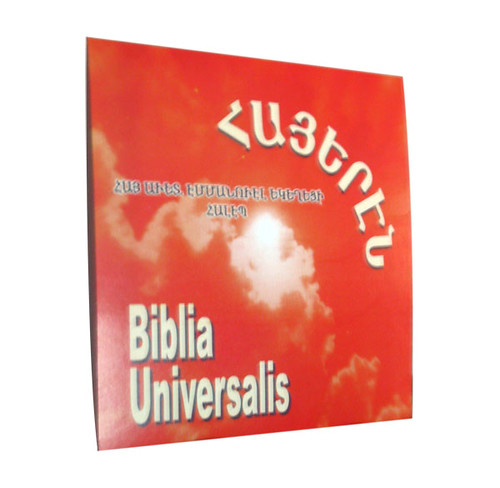
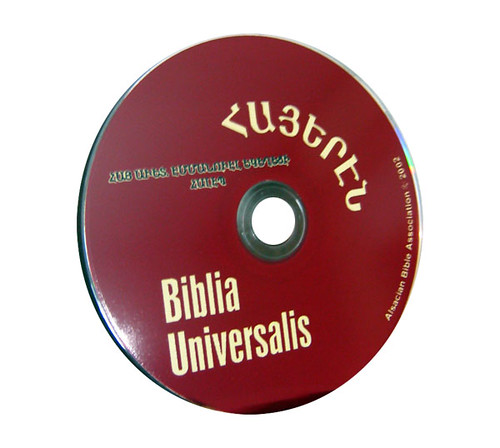
Material Included in the CD-ROM
- Western Armenian Reference Bible (Bible Society of Lebanon 2001)
- Louis Segond (French Bible 1910)
- Darby (French Bible (c) Editions Bibles et Litérature Chrétienne 1991)
- King Jame (English Bible 1611)
- Luther (German Bible 1912)
- La Nuova Diodati (Italian Bible (c) Edizione La Buona Novella 1991)
- La Santa Biblia NVI (Spanish Bible (c) International Bible Society 1999)
- Biblia Sagrada NVI (Portugese Bible (c) International Bible Society 1993, 2000)
- Vulgate (Latin Bible)
Armenian Bible (c) 2002 - Alsacian Bible Association


President of the Artsakh Republic Bako Sahakyan Visiting the Central Committee of the Union of the Armenian Evangelical Churches in the Near East

On 21 August, 2010 President of the Artsakh Republic Bako Sahakyan visited central committee of the Union of the Armenian Evangelical Churches in the Near East in the city of Beirut and met with its representatives at the head of the central committee's chairman Soghomon Kilaghbyan.
Bako Sahakyan rated high the role of the church in providing national education and maintaining Armenian national identity in the Diaspora pointing out Haigazian University, which is one of the leading Armenian higher educational establishments, as the best example of that.
The Head of the State expressed his gratitude to the Armenian Evangelical Church for carrying out different projects in Artsakh expressing hope that the circle of the projects would be enlarged.
Adviser to the President of the Artsakh Republic Armen Isagoulov, minister of education and science Vladik Khachatryan, head of the Central Information Department of the Office of the Artsakh Republic President David Babayan, permanent representative of the Artsakh Republic in Lebanon Karo Kebabjyan accompanied the Head of the State. Minister of Diaspora of the Republic of Armenia Hranoush Hakobyan and ambassador of the Republic of Armenia in Lebanon Ashot Kochartan partook at the events too.
http://www.president.nkr.am




